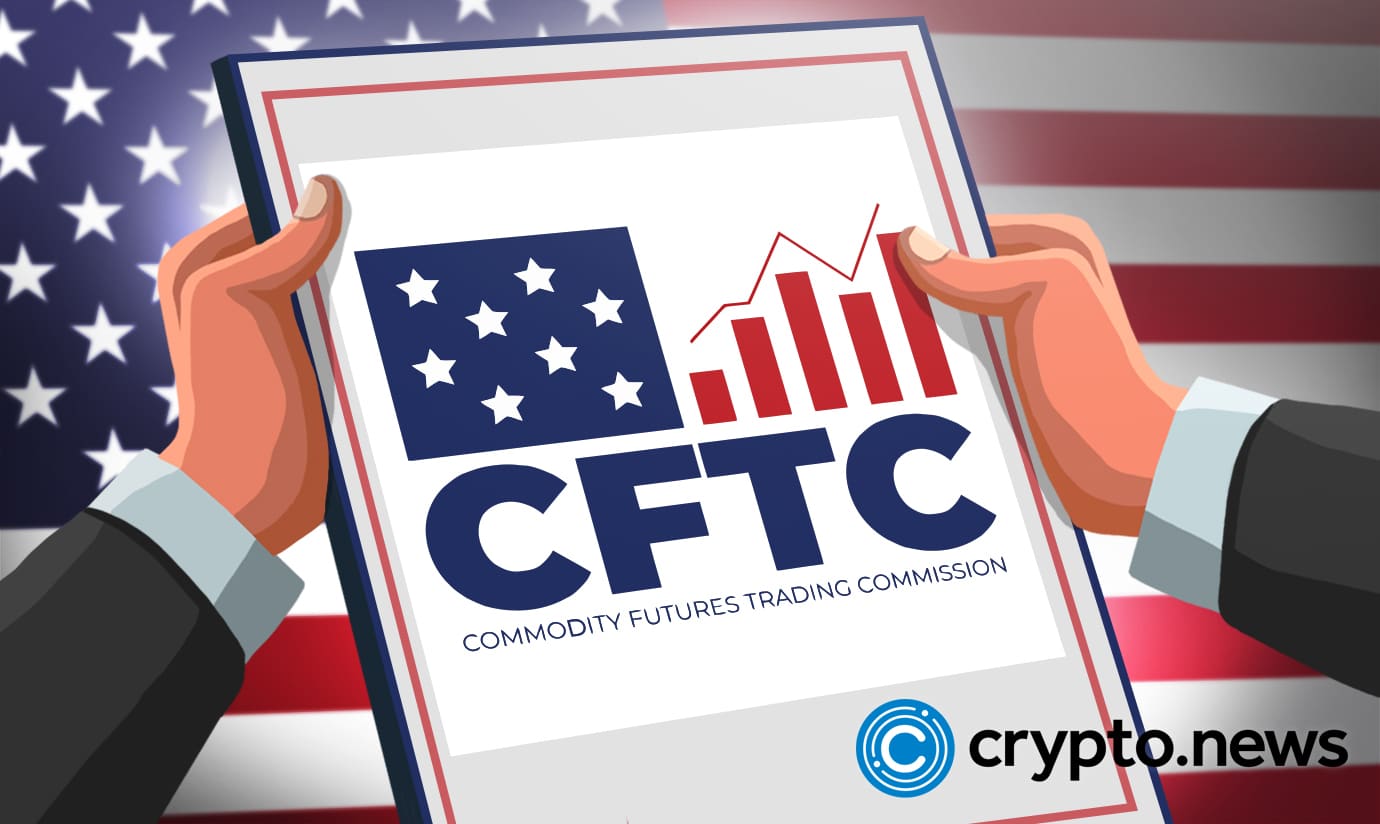CFTC
Trump in considerations for CFTC to regulate crypto
Published
6 months agoon
By
admin

The U.S. President-elect’s administration is considering the commodity trading authority to take over the crypto regulations.
The Commodity Futures Trading Commission (CFTC) is in Donald Trump’s eye to lead the emerging financial industry, cryptocurrency, after the exchange commission weighed on the past few years to rule.
According to Fox Business on Nov. 26, the effort to move the power to the CFTC has been seen as Trump and the Republican majority repeal the jobs from the Securities and Exchange Commission (SEC).
If the concept is approved by Congress, the commission will have a major role in regulating digital assets, as well as crypto-related products such as Bitcoin spot ETF and Ethereum spot ETF. It will also allow them to supervise the options market, which released some crypto products earlier this month.
The newly elected President also wanted to bring an innovative environment to the digital asset, which can create a better outlook for the industry since crypto is still considered as a new financial market.
SEC role will replaced by CFTC
The SEC, under Biden’s presidency, has received a lot of criticism from the crypto market due to the heavy enforcement of court and regulations. Last year, the commission was accusing crypto-related entities up to 46 times, which increased by 53% from the previous year. It is also the highest number of lawsuits since the commission supervised crypto in 2013, according to a report from Cornerstone Research.
Crypto exchanges, like Binance and Coinbase, are the major target for SEC lawsuits, including the Changpeng Zhao (CZ) cases for operating illegal exchanges and violating securities law. Coinbase is also facing the same lawsuit under SEC Chairman Gary Gensler, which indicates as unregistered exchange.
CFTC, on the other hand, will play a significant role in the growing industry with 50 million traders and a $3 trillion market size. The move also would allow the commission to regulate crypto exchanges, companies, and individuals in specific markets.
Source link
You may like


Ethereum Price Headed For Crash To $2,000 With Current Price Action


Tokenized funds hit $5.7B, scaling fast — Moody’s


Authorities Warn of Phony Text Messages Phishing for Sensitive Information, Telling Victims Their Bank Account Is at Risk


Tether invests in Chilean crypto exchange Orionx


MARA Hits Record-High Bitcoin Production in May


Retail investors no longer FOMO into BTC, altcoins
24/7 Cryptocurrency News
Crypto Perpetual Futures Could Soon Be Approved In The US
Published
2 weeks agoon
May 22, 2025By
admin
CFTC Commissioner Summer Mersinger says crypto perpetual futures can make their debut in the US amid a changing regulatory landscape. The outgoing CFTC Commissioner notes that an incoming approval will usher in a raft of benefits for the broader US economy.
CFTC Commissioner Hints At Crypto Perpetual Futures
CFTC Commissioner Summer Mersinger has confirmed plans by US authorities to approve crypto perpetual futures. The outgoing Commissioner disclosed plans in a Bloomberg interview, noting that the US markets are ripe for crypto perpetual futures to make their debut.
Mersinger, in response to a question over the status of their offerings, noted that the US is inching toward approval. However, Mersinger did not give a timeline for the approvals but hinted that crypto perpetual futures will be part of the wave of crypto regulations.
The US is galloping toward stablecoins and a crypto market structure regulation as the Senate advances the GENIUS Act one step closer to launch.
“It would be great to get that trading back onshore in the United States,” said Mersinger. “I think it’s unfortunate that it has been driven offshore for so long.”
While crypto perpetual futures are unavailable in the US, the offerings have surged in popularity in other jurisdictions. Exchanges like Binance and Bybit are recording significant volumes by offering the contracts to foreign-based investors.
These perpetual contracts differ from traditional futures as they allow traders to speculate on crypto prices without expiry dates. Furthermore, traders are attracted to crypto perpetual futures given the perks of leverage and funding fee payouts.
Aliyu Pokima
Aliyu Pokima is a seasoned cryptocurrency and emerging technologies journalist with a knack for covering needle-moving stories in the space. Aliyu delivers breaking news stories, regulatory updates, and insightful analysis with depth and precision. When he’s not poring over charts or following leads, Aliyu enjoys playing the bass guitar, lifting weights and running marathons.
Disclaimer: The presented content may include the personal opinion of the author and is subject to market condition. Do your market research before investing in cryptocurrencies. The author or the publication does not hold any responsibility for your personal financial loss.
Source link
CFTC
CFTC Welcomes Public Comments on 24/7 Trading – Acting Chairman Says Agency Must Take ‘Forward-Looking’ Approach
Published
1 month agoon
April 23, 2025By
admin
The Commodity Futures Trading Commission (CFTC) is asking the public to comment on the idea of allowing round-the-clock trading in derivatives markets.
In a statement, the federal agency, which regulates the derivatives markets, says it is exploring the possibility of 24/7 trading to keep up with shifting financial trends.
Says Acting Chairman Caroline Pham,
“As I have long said, the CFTC must take a forward-looking approach to shifts in market structure to ensure our markets remain vibrant and resilient while protecting all participants. One evolving trend is the move to 24/7, 24/6, or 24/5 trading hours. I look forward to the public comments on this market innovation.”
The agency is specifically seeking comments on the effects and risks of permitting trading at all hours of the day.
“This request seeks comment on the implications of extending the trading of CFTC-regulated derivatives markets to an effectively 24/7 basis, including the potential effects on trading, clearing and risk management which differ from trading during current market hours. The request also seeks comment on the risks of 24/7 trading, and the associated clearing systems, including risks related to the areas of market integrity, customer protection or retail trading.”
The agency will receive public comment until May 21st.
Follow us on X, Facebook and Telegram
Don’t Miss a Beat – Subscribe to get email alerts delivered directly to your inbox
Check Price Action
Surf The Daily Hodl Mix
 

Disclaimer: Opinions expressed at The Daily Hodl are not investment advice. Investors should do their due diligence before making any high-risk investments in Bitcoin, cryptocurrency or digital assets. Please be advised that your transfers and trades are at your own risk, and any losses you may incur are your responsibility. The Daily Hodl does not recommend the buying or selling of any cryptocurrencies or digital assets, nor is The Daily Hodl an investment advisor. Please note that The Daily Hodl participates in affiliate marketing.
Generated Image: Midjourney
Source link
CFTC
Senator Tim Scott Says Crypto Market Structure Bill To Be Passed by August of This Year
Published
2 months agoon
April 14, 2025By
admin
Republican Senator Tim Scott of South Carolina says a bill seeking to create a comprehensive regulatory framework for the digital asset space will become law later this year.
In a new interview with Fox News, Scott, the chairman of the Senate Committee on Banking, Housing, and Urban Affairs, says a bill that will help crypto firms thrive and innovate is set to be passed later this year, countering the last regime’s stance on digital assets.
“There’s no doubt that under the Biden Administration and [Chairman Gary] Gensler at the SEC – they just didn’t like crypto. What I’ve said very often is simply this: we must innovate before we regulate. That means allowing innovation to happen here at home in the digital assets space is critical to American economic dominance across the globe.
The good news is President Trump is leading the way to a crypto revolution starting here at the Banking Committee. And that’s why we’ve moved very quickly the GENIUS Act… It’s passed through my Committee in a bipartisan fashion. Next [is] market structure…I believe [it will be] passed into law by August.”
The Genius Act, which establishes regulations for stablecoins, is headed to the Senate floor for a vote after the Senate Banking Committee approved the bill with a bipartisan vote of 18-6.
While Scott says a bill to establish a crypto market structure is next, he didn’t mention any specific piece of legislation.
However, one bill that fits the mold is the Digital Asset Market Structure and Investor Protection Act, which would give the Commodities Futures Trading Commission (CFTC) regulatory power over digital assets while handing the U.S. Securities and Exchange Commission (SEC) the authority to oversee digital asset securities.
Follow us on X, Facebook and Telegram
Don’t Miss a Beat – Subscribe to get email alerts delivered directly to your inbox
Check Price Action
Surf The Daily Hodl Mix
 

Disclaimer: Opinions expressed at The Daily Hodl are not investment advice. Investors should do their due diligence before making any high-risk investments in Bitcoin, cryptocurrency or digital assets. Please be advised that your transfers and trades are at your own risk, and any losses you may incur are your responsibility. The Daily Hodl does not recommend the buying or selling of any cryptocurrencies or digital assets, nor is The Daily Hodl an investment advisor. Please note that The Daily Hodl participates in affiliate marketing.
Generated Image: Midjourney
Source link
Ethereum Price Headed For Crash To $2,000 With Current Price Action
Tokenized funds hit $5.7B, scaling fast — Moody’s
Authorities Warn of Phony Text Messages Phishing for Sensitive Information, Telling Victims Their Bank Account Is at Risk

Tether invests in Chilean crypto exchange Orionx

MARA Hits Record-High Bitcoin Production in May
Retail investors no longer FOMO into BTC, altcoins
AVAX Rises 3.8% on Strong Volume, Breaking Key Resistance Levels

K33 begins Bitcoin buying with 10 BTC purchase for treasury strategy
Why $107,500 And $103,500 Are The Levels To Watch
Pakistan Proposes New Crypto Regulations
Japanese Bitcoin Hoarder Metplanet Adds $115,600,000 Worth of BTC As Stock Surpasses 263% Gains on the Year
Bitcoin traders anticipate decline, watch $100K
Ethereum Foundation Restructures R&D Division, Plans ‘Rethink’ on Design and Development
Here’s why Sophon crypto rallied over 40% today
BCB Strikes Deal with SocGen–FORGE to Distribute Euro-Pegged Stablecoin EURCV

Arthur Hayes, Murad’s Prediction For Meme Coins, AI & DeFi Coins For 2025

Pi Network coin to $10? 4 catalysts that may make it possible

3 Voting Polls Show Why Ripple’s XRP Price Could Hit $10 Soon

Expert Sees Bitcoin Dipping To $50K While Bullish Signs Persist

Aptos Leverages Chainlink To Enhance Scalability and Data Access

Bitcoin Could Rally to $80,000 on the Eve of US Elections

Crypto’s Big Trump Gamble Is Risky

The Future of Bitcoin: Scaling, Institutional Adoption, and Strategic Reserves with Rich Rines

Institutional Investors Go All In on Crypto as 57% Plan to Boost Allocations as Bull Run Heats Up, Sygnum Survey Reveals

Sonic Now ‘Golden Standard’ of Layer-2s After Scaling Transactions to 16,000+ per Second, Says Andre Cronje

Ripple-SEC Case Ends, But These 3 Rivals Could Jump 500x

Has The Bitcoin Price Already Peaked?

A16z-backed Espresso announces mainnet launch of core product

Blockchain groups challenge new broker reporting rule

Xmas Altcoin Rally Insights by BNM Agent I
Trending

 24/7 Cryptocurrency News7 months ago
24/7 Cryptocurrency News7 months agoArthur Hayes, Murad’s Prediction For Meme Coins, AI & DeFi Coins For 2025

 Markets3 months ago
Markets3 months agoPi Network coin to $10? 4 catalysts that may make it possible

 Ripple Price3 months ago
Ripple Price3 months ago3 Voting Polls Show Why Ripple’s XRP Price Could Hit $10 Soon

 Bitcoin5 months ago
Bitcoin5 months agoExpert Sees Bitcoin Dipping To $50K While Bullish Signs Persist

 24/7 Cryptocurrency News5 months ago
24/7 Cryptocurrency News5 months agoAptos Leverages Chainlink To Enhance Scalability and Data Access

 Bitcoin7 months ago
Bitcoin7 months agoBitcoin Could Rally to $80,000 on the Eve of US Elections

 Opinion7 months ago
Opinion7 months agoCrypto’s Big Trump Gamble Is Risky

 Bitcoin4 months ago
Bitcoin4 months agoThe Future of Bitcoin: Scaling, Institutional Adoption, and Strategic Reserves with Rich Rines



✓ Share: